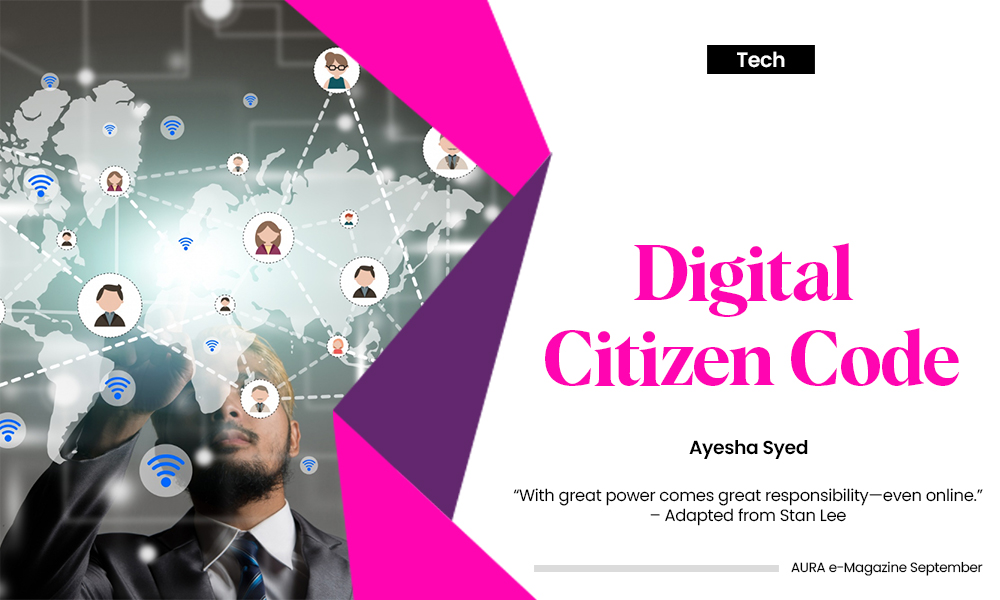“With great power comes great responsibility—even online.”
– Adapted from Stan Lee

Digital Citizenship
Just as citizenship allows individuals to legally be a part of a country and enjoy its rights and freedom, digital citizenship grants people a place in the digital space, along with its benefits and responsibilities. As citizens of a state, individuals are bound to follow the rules, duties, and responsibilities; similarly, being a part of an online/digital space comes with its principles. Understanding these principles ensures our digital environments are used properly and respectfully.
Digital citizenship refers to individuals’ ethical and responsible behaviour in the digital world. Where globalisation has turned the world into one big global village, digitalisation has further blurred the sense of boundaries. As our interaction with the digital realm is ever-increasing, it is important to understand the proper usage of digital spaces to keep things civil, healthy and productive. A digital citizen uses technology sensibly and responsibly while being respectful and adding positively to the online community.
The Principles of Digital Citizenship
1. Respecting others online
One of the key aspects of digital citizenship is showing respect to others online. The internet has made it easy for people to wear the mask of anonymity. This mask has diminished empathy from people, making it easier for them to criticise, bully, and troll others without any consequences. Respecting others in a digital space is essential as it helps maintain decorum. Digital citizens should understand that almost everyone else on the internet is a human, just like them. They should be handled with sensitivity, care, and respect.
2. Privacy and Personal Data
Privacy and protection of personal data pose extreme importance in digital spaces. Understanding the need to protect your identity, as well as the identities of others online, is necessary to create safe spaces. With the rise in identity theft, scams, frauds, and deepfakes, one should always be mindful of what they share online.
3. Digital Footprints
Online, nothing is ever truly deleted. Once something is uploaded, it leaves a digital footprint. Recently, many cases have surfaced where old data has been dug up, leading to controversies and scandals. Digital citizens must understand that their actions can have a long-lasting impact on themselves and others. This realisation brings a sense of accountability, and people become more conscious of what they post in digital spaces.
4. Information Literacy
The internet has made an overwhelming amount of information accessible to humans. Amid this information overload, it is important to distinguish what is right from what is false. Developing this sense requires learning to think critically. This involves evaluating the credibility of sources, recognising bias, and distinguishing between facts and opinions. A morally responsible digital citizen does not partake in spreading incorrect information.
Ethical Implications of Digital Citizenship
Digital citizenship is inherently tied to morality. As the information and content uploaded on the digital space live forever, digital citizenship calls for ethical behaviour. The moral implications of digital citizenship impact individuals, communities, and society.
1. Promoting a Positive Digital Culture
By using digital platforms responsibly, individuals contribute to creating a positive digital culture. This includes promoting inclusivity, shunning bullying and discrimination, supporting marginalised voices, and maintaining a positive outlook towards diverse content and people. Digital platforms are also responsible for promoting positivity and quickly addressing negativity as it emerges.
2. Managing Freedom & Responsibility
The digital world offers unprecedented freedom of expression. However, people often overlook the fact that this freedom comes with responsibility. Just like in face-to-face conversations where individuals are aware of other people’s rights, digital citizens must navigate the line between expressing themselves and respecting the rights of others.
This balance is paramount in maintaining a moral space where diverse perspectives can coexist. An imbalance creates chaos and leads to verbal feuds, animosity and division.
3. The Responsibilities of Content Creation and Consumption
With the rise in content creation, it is crucial to understand the ethical responsibility that falls on the content maker. A content creator should be transparent and honest, avoid harmful content, not act as fuel by propagating fake news, and not indulge in activities that disrupt the harmony of social spaces. Whether writing a blog post, making videos, or leaving a comment, the content one creates can influence others, and people should be mindful of this.
The Role of Education in Digital Citizenship
As technology continues to become an integral part of our lives, education plays a pivotal role in digital citizenship and creating responsible digital citizens. Schools, communities, and organisations must work together to equip individuals with the knowledge and skills to navigate the digital world responsibly. Teaching young people how to navigate and use technology and how to use it ethically is important.
Digital education should become a part of the curriculum. Teachers should educate students about online safety, privacy, identity protection, and respectful communication. Lessons on media literacy and critical thinking are also essential, as they will help distinguish between fake news and credible sources of information.
Digital citizenship is not just for young people; the older generation is also heavily invested in the online world. Lifelong learning should be promoted. Technology is evolving at an extremely fast pace, and so are its various aspects. The meaning of digital citizenship is changing, too. Artificial Intelligence has led people to misuse and exploit its darker sides, raising questions of morality in this realm.
As digital citizens, we are responsible for contributing to an ethical digital environment that upholds the principles of respect, responsibility, and moral behaviour. By understanding and embracing the role and importance of digital citizenship, we can help build a digital world that reflects the best of our shared values and humanity.


0 Comments